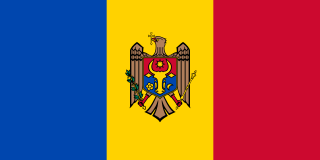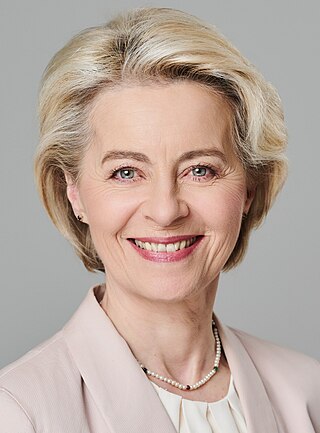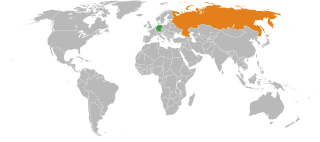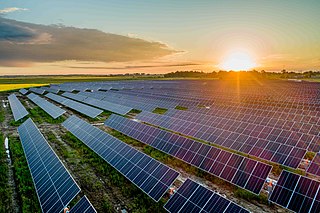Related Research Articles

Moldova, officially the Republic of Moldova, is a landlocked country in Eastern Europe, on the northeastern corner of the Balkans. The country spans a total of 33,483 km2 (12,928 sq mi) and has a population of approximately 2.5 million as of January 2023. Moldova is bordered by Romania to the west and Ukraine to the north, east, and south. The unrecognised breakaway state of Transnistria lies across the Dniester river on the country's eastern border with Ukraine. Moldova is a unitary parliamentary representative democratic republic with its capital in Chișinău, the country's largest city and main cultural and commercial centre.

Reliance Industries Limited is an Indian multinational conglomerate headquartered in Mumbai. Its businesses include energy, petrochemicals, natural gas, retail, entertainment, telecommunications, mass media, and textiles. Reliance is the largest public company in India by market capitalisation and revenue, and the 100th largest company worldwide. It is India's largest private tax payer and largest exporter, accounting for 7% of India's total merchandise exports. The company has relatively little free cash flow and high corporate debt.

Energy policy are the government's strategies and decisions regarding the production, distribution, and consumption of energy within a specific jurisdiction.The decisions regarding energy policy will affect how high the greenhouse gas emissions by that country are. Energy policy is closely related to climate change mitigation policies because the energy sector emits more greenhouse gas worldwide than any other sector. The attributes of energy policy include legislation, international treaties, guidelines for energy conservation, energy subsidies and other public policy techniques.

Ursula Gertrud von der Leyen is a German physician and politician serving as the 13th president of the European Commission since 2019. She served in the German federal government between 2005 and 2019, holding successive positions in Angela Merkel's cabinet, most recently as federal minister of defence. Von der Leyen is a member of the centre-right Christian Democratic Union (CDU) and its affiliated europarty, the European People's Party (EPP). On 7 March 2024, the EPP elected her as its Spitzenkandidat to lead the campaign for the 2024 European parliament elections.

Russia–European Union relations are the international relations between the European Union (EU) and Russia. Russia borders five EU member states: Estonia, Finland, Latvia, Lithuania and Poland; the Russian exclave of Kaliningrad is surrounded by EU members. Until the radical breakdown of relations following the 2022 Russian invasion of Ukraine, the EU was Russia's largest trading partner and Russia had a significant role in the European energy sector. Due to that full-scale invasion, relations became very tense after the European Union imposed sanctions against Russia. Russia placed all member states of the European Union on a list of "unfriendly countries", along with Taiwan, South Korea, Japan, Singapore, the United States, NATO members, Canada, Australia, New Zealand, Norway, Switzerland, Micronesia and Ukraine.

Germany–Russia relations display cyclical patterns, moving back and forth from cooperation and alliance to strain and to total warfare. Historian John Wheeler-Bennett says that since the 1740s:

The energy policy of the European Union focuses on energy security, sustainability, and integrating the energy markets of member states. An increasingly important part of it is climate policy. A key energy policy adopted in 2009 is the 20/20/20 objectives, binding for all EU Member States. The target involved increasing the share of renewable energy in its final energy use to 20%, reduce greenhouse gases by 20% and increase energy efficiency by 20%. After this target was met, new targets for 2030 were set at a 55% reduction of greenhouse gas emissions by 2030 as part of the European Green Deal. After the Russian invasion of Ukraine, the EU's energy policy turned more towards energy security in their REPowerEU policy package, which boosts both renewable deployment and fossil fuel infrastructure for alternative suppliers.

Russia supplies a significant volume of fossil fuels to other European countries. In 2021, it was the largest exporter of oil and natural gas to the European Union, (90%) and 40% of gas consumed in the EU came from Russia.
Energy in Estonia has heavily depended on fossil fuels. Finland and Estonia are two of the last countries in the world still burning peat.
Energy in Europe includes energy, including electricity, production, consumption and import in Europe.

Lithuania is a net energy importer. In 2019 Lithuania used around 11.4 TWh of electricity after producing just 3.6 TWh.

Primary energy use in Slovakia was 194 TWh and 36 TWh per million inhabitants in 2009.
International sanctions have been imposed against Russia and Crimea during the Russo-Ukrainian War by a large number of countries, including the United States, Canada, the European Union, and international organisations following the Russian annexation of Crimea, which began in late February 2014. Belarus has also been sanctioned for its cooperation with and assistance to Russian armed forces. The sanctions were imposed against individuals, businesses, and officials from Russia and Ukraine. Russia responded with sanctions against several countries, including a total ban on food imports from Australia, Canada, Norway, Japan, the United States, the EU and the United Kingdom.

Robert Habeck is a German Green politician and writer who has been serving as Vice Chancellor of Germany, Federal Minister for Economic Affairs and Climate Action in the cabinet of Chancellor Olaf Scholz and as a Member of the German Bundestag for Flensburg – Schleswig since 2021. From 2018 to 2022, he also served as co-leader of Alliance 90/The Greens, alongside Annalena Baerbock. For the 2021 German federal election, he was a member of the leading duo, alongside Baerbock, who ran for chancellor of Germany.
A global energy crisis began in the aftermath of the COVID-19 pandemic in 2021, with much of the globe facing shortages and increased prices in oil, gas and electricity markets. The crisis was caused by a variety of economic factors, including the rapid post-pandemic economic rebound that outpaced energy supply, and escalated into a widespread global energy crisis following the Russian invasion of Ukraine. The price of natural gas reached record highs, and as a result, so did electricity in some markets. Oil prices hit their highest level since 2008.

The economic impact of the Russian invasion of Ukraine began in late February 2022, in the days after Russia recognized two breakaway Ukrainian republics and launched an invasion of Ukraine. The subsequent economic sanctions have targeted large parts of the Russian economy, Russian oligarchs, and members of the Russian government. Russia responded in kind. A wave of protests and strikes occurred across Europe against the rising cost of living.
Following Russia's invasion of Ukraine beginning on 24 February 2022, the United States, the European Union, and other Western countries introduced or significantly expanded sanctions covering Russian President Vladimir Putin, other government members and Russian citizens in general. Some Russian banks were banned from using the SWIFT international payments system. The sanctions and the boycotts of Russia and Belarus impacted the Russian economy.

The Russia–EU gas dispute flared up in March 2022 following the invasion of Ukraine on 24 February 2022. Russia and the major EU countries clashed over the issue of payment for natural gas pipelined to Europe by Russia's Gazprom, amidst sanctions on Russia that were expanded in response to Russia's 2022 invasion of Ukraine. In June, Gazprom claimed it was obliged to cut the flow of gas to Germany by more than half, as a result of such sanctions that prevented the Russian company from receiving its turbine component from Canada. On 26 September 2022, three of the four pipes of the Nord Stream 1 and 2 gas pipelines were sabotaged. This resulted in a record release of 115,000 tonnes of methane (CH4) – an equivalent of 15 million tonnes of carbon dioxide (CO2) – and is believed to have made a contribution to global warming.
Stop Bloody Energy project is a global initiative of Ukrainian energy companies aimed at refusing to buy Russian energy resources and cooperating with Russia in the energy sector due to its war against Ukraine. The project was launched by Rinat Akhmetov's private company DTEK and the state-owned companies Naftogaz and Ukrenergo.
The SWIFT ban against some Russian banks is one of several international sanctions against the Russian regime imposed by the European Union and other western countries as a result of its invasion of Ukraine, aimed at weakening the country's economy to end the invasion by hindering Russian access to the SWIFT financial transaction processing system.
References
- ↑ McGrath, Matt (8 March 2022). "Climate change: EU unveils plan to end reliance on Russian gas". BBC News .